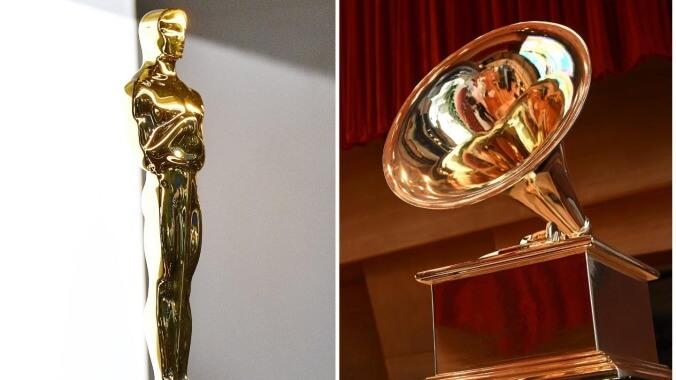What can the Oscars learn from the newly resurgent Grammys?
The 2023 edition of the Grammys posted its highest ratings since before the pandemic. Here's how the Oscars could follow suit

Congratulations are in order to the Grammys for pulling itself up by the bootstraps: the 2023 ceremony pulled in 12.4 million viewers, the highest since 2020 (which racked up 18.69 million viewers). It’s a 30% increase from the 2022 show, which saw only 9.6 million viewers. The news is a shot of optimism on the awards circuit, which has struggled to regain its pre-pandemic footing— just look at the Golden Globes’ dismal ratings decline as an example.
Even the Oscars, an awards show titan, has had difficulty keeping up. The ratings posted in 2022 (13.7 million) were its second-worst ever after the 2021 show (9.8 million). Compare that to the halcyon days of February 2020, when Movies’ Biggest Night drew 23.6 million viewers (which was actually, at the time, a record low for the Academy Awards. Simpler times!).
Can the Oscars ever be restored to its former glory? Probably not—television audiences just aren’t what they used to be. But the ceremony could take a few pointers from the Grammys on how to turn the ship around for an increase in viewership.
One thing the Grammys did—something that the Oscars has gotten in trouble with—is shirking some of the awards categories in favor of flashy performances. It’s already too late for that this year, but one can’t deny that displaying the craft of musicianship—as in, actually seeing musicians in action—benefitted the Grammys immensely. This wasn’t only evident in individual artists’ performances, but in the group tribute acts. The Motown medley and the 50th anniversary of hip-hop brought together big stars in a way that was not only entertaining but nodded to music history. Even the extra-long In Memoriam felt like a unique way to respect deceased artists while at the same time showcasing a diverse set of musicians. Quavo’s tribute to Takeoff, in particular, was a genuine, emotionally resonant moment because of the personal connection it evoked. Personal connection was indeed a theme of the evening, as friends, fans, and relatives took the stage to explain what each artist’s work meant to them.
While the Oscars generally features a few musical moments, it doesn’t have live performances built into its structure in the same way. However, the Academy might find its own ways to accomplish the same goals. Past years have seen inventive ways of weaving film history into the ceremony; a focus on a certain genre, a la the hip-hop tribute, could be a fun trip down memory lane. Personal connection is also not difficult to capitalize on when the Oscars’ live audience is filled with cinephiles. Previous years have seen stars introducing Best Picture nominees for which they were fans or to which they otherwise had a relationship (see: Barbra Streisand’s BlacKkKlansman intro). For audiences that might feel a disconnect from some of the smaller films nominated, hearing others describe what they love about a movie can of course be as potent an endorsement as a trophy.
The other success of the Grammys, inescapably, is celebrity. For one thing, the show had a looser atmosphere than in the past, grouping major stars at tiny tables and allowing them to move around and interact freely. That’s how you get viral moments like Taylor Swift visiting Harry Styles’ table for a chat or Lizzo looking around for Beyoncé. To be fair, this method has not worked in favor of the Golden Globes. However, bringing down the rigidity ever so slightly might be enough of a compromise to give the Oscars a boost. After all, remember the Oscars selfie? Feels quaint now, but that ceremony did land 43.7 million viewers. A loose, semi-organic celebrity moment can go a long way.
Of course, getting the right celebrities in the room is crucial to having audiences at home tune in. This year’s Grammys had the benefit of a high-wattage crop of nominees, with Swift, Styles, Adele, Beyoncé, and Lizzo vying for major prizes. The Recording Academy wisely kept those categories to the end of the night, forcing fans to see the ceremony through to its (somewhat controversial) conclusion. “Standom” was the true engine of the evening, so much so that the fans’ arguments for their faves was actually a recurring segment throughout the show.
The Oscars will have no shortage of stars, but it doesn’t have the benefit of the Beyhive or any slightly comparable fanbase to which it might cater. However, it does have some much-beloved nominees on its roster, and playing up their value could give the show a boost. Perhaps there’s no narrative as compelling as the second showdown of Adele vs. Beyoncé (who saw their big prize snatched away by Harry Styles), but the Oscars does have the formidable matchup of Cate Blanchett vs. Michelle Yeoh (should they watch out for Andrea Riseborough? Just kidding. Hopefully.) Investing in friendly fan rivalries about their favorite stars and movies could be good a way to engage viewership.
Whether any of these tricks work for the Oscars—or indeed, whether they try out any of the Grammys’ tricks at all—remains to be seen. Audiences will tune in (or not) to see for themselves on March 12, 2023.